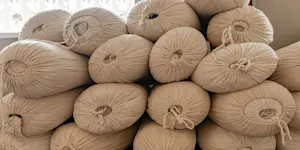What Makes This Word Tick
The word "talisman" carries an aura of mystery and protection, often referring to an object believed to have magical powers that provide good luck or guard against evil. Whether it's a simple stone with a curious shape or an intricately carved amulet, a talisman is imbued with significance and often worn or kept close by its owner.
If Talisman Were a Person…
Talisman would be that mysterious friend who always has a fascinating story to tell. They'd have an eclectic collection from their travels, each item with a tale of wonder. With a watchful eye and a protective nature, Talisman ensures everyone feels a little bit safer, though you're never quite sure how they do it.
How This Word Has Changed Over Time
The idea of a talisman has been around for centuries, rooted in ancient civilizations where objects were linked with supernatural powers. While in the past it was often associated with religious or spiritual practices, today it might be used more loosely to describe any object that's considered a personal good luck charm.
Old Sayings and Proverbs That Use Talisman
While not headlining the most famous proverbs, you might hear someone say, "Keep your talisman close," which underscores the importance of having that little bit of extra luck or protection in your pocket or around your neck.
Surprising Facts About Talisman
Did you know that talismans have been found among many different cultures, spanning from the Egyptians to the Celts? Each culture has its own variations and symbolism, yet the underlying belief remains remarkably similar: these objects are more than just decorative.
Out and About With This Word
Talismans are alive and well today, though often in the guise of charms and jewelry. You might spot them at craft fairs or spiritual shops, sometimes marketed as having special powers like healing or attracting wealth. A "love talisman," for instance, would catch the eye of the romantically inclined.
Pop Culture Moments Where Talisman Was Used
Talismans frequently pop up in fantasy films and books, like in "The Lord of the Rings," where objects such as rings and stones hold magical properties. They're the ultimate MacGuffins—objects that drive a plot but have more weight than mere narrative devices.
The Word in Literature
You'll often find talismans in fantasy literature, where they are endowed with magical properties that are pivotal to the story's progression. Think about the mystical objects that heroes seek to aid them on their quests; talismans are central to these adventures.
Moments in History with Talisman
In the Middle Ages, talismans were not just trinkets but serious business. Knights often carried them into battle, believing these objects could shield them from harm and bring victory, showing just how deeply they were woven into the fabric of life back then.
This Word Around the World
In Japanese culture, there are Omamori, amulets sold at Shinto shrines, which serve much the same purpose as talismans by bringing good luck. Meanwhile, in the Middle East, the Nazar, or "evil eye" amulet, is a common sight, protecting the wearer from malevolent glances.
Where Does It Come From?
The word "talisman" is believed to have originated from the Arabic word "ṭilasm," which in turn comes from the Greek "telesma," meaning "consecration" or "a religious rite," highlighting its ancient roots in ceremonial magic and spiritual practice.
How People Misuse This Word
People sometimes mix up talismans with souvenirs or memorabilia. While both can hold personal significance, it's the belief in magical or protective properties that sets talismans apart—not just as keepsakes but as companions on one’s journey.
Words It’s Often Confused With
Amulet: Often interchangeable, but amulets are typically worn, while talismans might be carried or kept nearby.
Charm: This can refer to an object or attribute; charms are frequently seen as having more generalized luck-bringing qualities.
Fetish: Historically used to describe an object believed to have magical powers, though it now carries quite different connotations.
Additional Synonyms and Antonyms
Synonyms for talisman include amulet, charm, and mascot. Antonyms are harder to pin down but could include curse or jinx, emphasizing the absence of protective qualities.
Want to Try It Out in a Sentence?
You'll feel a bit like an adventurous detective with a talisman in your pocket, as if the day holds promise and perhaps a touch of magic, waiting just around the corner.
















